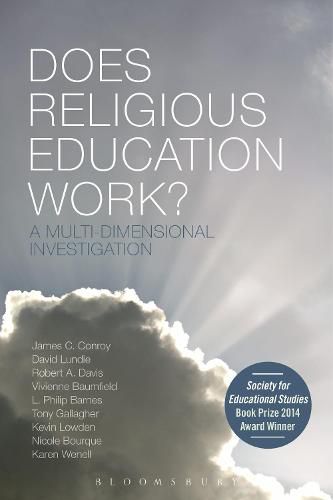Readings Newsletter
Become a Readings Member to make your shopping experience even easier.
Sign in or sign up for free!
You’re not far away from qualifying for FREE standard shipping within Australia
You’ve qualified for FREE standard shipping within Australia
The cart is loading…






Society for Educational Studies Annual Book Prize winner: 2nd Prize
This ground-breaking volume draws upon a rich and variegated range of methodologies to understand more fully the practices, policies and resources available in and to religious education in British schools. The descriptions, explanations and analyses undertaken here draw on an innovative combination of policy work, ethnography, Delphi methods, Actor Network Theory, questionnaires, textual analysis as well as theological and philosophical insight. It traces the evolution of religious education in a post-religious age from the creation of policy to the everyday experiences of teachers and students in the classroom. It begins by analysing the way in which policy has evolved since the 1970s with an examination of the social forces that have shaped curriculum development. It goes on to explore the impact and intentions of a diverse group of stakeholders with sometimes competing accounts of the purposes of religious educations. It then examines the manner in which policy is, or is not, enacted in the classroom. Finally, it explores contradictions and confusions, successes and failures, and the ways in which wider public debates enter the classroom. The book also exposes the challenge religious education teachers have in using the language of religion.
$9.00 standard shipping within Australia
FREE standard shipping within Australia for orders over $100.00
Express & International shipping calculated at checkout
Society for Educational Studies Annual Book Prize winner: 2nd Prize
This ground-breaking volume draws upon a rich and variegated range of methodologies to understand more fully the practices, policies and resources available in and to religious education in British schools. The descriptions, explanations and analyses undertaken here draw on an innovative combination of policy work, ethnography, Delphi methods, Actor Network Theory, questionnaires, textual analysis as well as theological and philosophical insight. It traces the evolution of religious education in a post-religious age from the creation of policy to the everyday experiences of teachers and students in the classroom. It begins by analysing the way in which policy has evolved since the 1970s with an examination of the social forces that have shaped curriculum development. It goes on to explore the impact and intentions of a diverse group of stakeholders with sometimes competing accounts of the purposes of religious educations. It then examines the manner in which policy is, or is not, enacted in the classroom. Finally, it explores contradictions and confusions, successes and failures, and the ways in which wider public debates enter the classroom. The book also exposes the challenge religious education teachers have in using the language of religion.